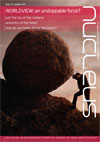'what the heart loves, the will chooses, and the mind justifies'
As medical and nursing students, we think we know the human heart well. You may have dissected one. You may know how to diagnose an inferior myocardial infarction with a glance at an ECG. In a profession where we are expected to know the most about the human heart, I want to suggest that our understanding of it is woefully deficient. In fact, I was guilty of this until I recently heard Professor Glynn Harrison talk about the need for a truly biblical, more psychologically plausible understanding of heart.
What is the heart?
The bible describes the heart as the seat of personality, (1) the meeting point of feeling, thinking and desiring that forms the intention of our will.
Emotion
Let's get this one out the way. It is when our hearts 'leap' when we see someone we love, just like mine did when I saw my future wife when I was a third year.
Cognition
We have previously defined worldview as 'a set of beliefs and assumptions that a person uses when interpreting the world around them'. We were challenged to engage our minds and encouraged that in Christ we can know renewal of our minds (and indeed of our worldviews). (2)
There is a lot of psychological evidence that much of our moral reasoning (up to 95% of all daily decisions) is carried out at a subliminal level, a 'gut response' if you like. So only 5% of what we do in a given day is the outcome of conscious, deliberate choices! (3) Learning to drive is a perhaps painful example to consider. Think of all those deliberate actions that become more and more habitual. But imagine if every decision was like this, if we weighed up every option in a deliberate fashion every time? It would be a nightmare.
Now, I believe that the evidence for Christianity is consistent and reliable and true, that we are supposed to engage our minds and that through Christ the renewal of our minds (our worldviews) can transform us. And yet, so many people still reject Christianity despite many ideas that they hold not passing the test of rationality or reason (the intolerance of tolerance for example, or 'there is no absolute truth' stated with great confidence).
How can this be? If in our consideration of worldview we reduce humans to brains on sticks who are solely rational beings, we will miss the point. Because there is more to our hearts than an emotional or rational element. Something else is going on.
Desire
In the picture opposite the rider of an elephant represents our rational mind. He guides the elephant as it trudges well-worn paths in search of bananas. He seems to have control. but the elephant is not easily guided, as I found out when I rode one for the first (and last) time. When he is on the march, it is almost impossible to shift him from his path. He has experience of this path — it leads to bananas! To persuade him to take an alternative route through undergrowth will be nigh-on impossible.
The elephant in this example represents the human heart. and it represents the reality that people are driven not by ideas but by the heart. Thomas Cranmer is quoted as saying 'What the heart loves, the will chooses, and the mind justifies'. Five hundred years later, this still rings true. The media knows how to work on our hearts, seducing us with music, film and adverts. They know that when they have captured our desire, they will have our minds too.
Take the latest launch of a smartphone for example (or any advert relating to cars, beer or fashion). The images are seductive. I just have to look at the phone to think it's beautiful and that I want it. I am often reminded verbally too, with taglines like 'a great product depends on how it makes you feel'. You see, the advertisers want my heart first - once they have my heart, the mind will justify it. I won't read the four pages of terms and conditions I am handed by the sales rep. Just tick the boxes, sign here and it's all mine. Because I want it, I will choose to buy it and quickly justify it. My rational mind has no chance when my desiring faculties kick in.
You are what you love
The heart isn't a receptacle for processing thought; it orientates it. It is a goal-directed desire factory. (4) Don't you feel it? The urges, the deep desires that can capture you and direct your time, and maybe your whole life? Indeed, it's not that our intellect has been hijacked by bad ideas per se, but because our desires have been captured by rival visions of flourishing. Stories that shape and form our worldview and that grip our hearts.
When confronted with issues in Nucleus and on the website, please go back to this foundational level. The reason people live the way they do is because of the orientation of their heart. They are, at the core of their being, worshippers. Whether it is money and things, body and beauty, power or intellect, these god-substitutes (or idols as Romans 1 describes) always promise more and more but deliver less and less until they have everything and you have nothing.
As prospective medics and nurses we know this. We know that most people we see are presenting with symptoms of a deeper problem. depression, ulcers, relationship breakdowns, addictions, overeating — all rife in our society. It's not that people need more education; it's because we love the wrong things. these are ultimately issues of the heart. That is why the gospel is such good news. that is why Paul can say 'I am not ashamed of the gospel, because it is the power of God that brings salvation to everyone who believes' (Romans 1:16). Our disordered loves can be rightly aligned. Our corrupted desires can be redeemed.
What (or who) do you love?
You can't not love. So the question isn't whether you will love something as ultimate - the question is what you will love as ultimate. (5) When Jesus was on earth he never asked a non-believer 'what do you believe?' or 'what do you think?' He would ask 'what do you want?' or 'who do you love?' (6) He summed up the greatest commandment as 'love the Lord your God with all your heart... soul... and mind' (Matthew 22:37).
And the question is the same to us. What do you love? What are you becoming? Which story has captured your imagination? because it is this story that you will 'carry in your bones' and that will shape your study, your values and your actions more than you can imagine.
If you struggle with this as I do, then you will know that what we need is not to be told to stop doing this or thinking that. We need to be reminded of the story we are called to be a part of. We need a panoramic view of what human flourishing looks like that is so compelling and beautiful and attractive that it will grip our hearts. and we see this most supremely in the person of Jesus Christ. Do you love him? Are you captivated by him? Because he can satisfy your deepest desires. (7) He is a teacher who doesn't just form your intellect, he is after your desires. Your desire for fullness, meaning, unconditional love, justice... Will you love him and let him shape your whole life?
How do you love rightly?
God has given us disciplines of grace to help orientate our heart and our love toward him. We are called to guard our hearts. (8) to form healthy habits. to direct the elephant. When I read and pray daily I am reminded of the story and invited to participate in it. I am invited to renounce idols and be gripped again by the beauty of the gospel.
as we live in the melting pot of worldviews at university, CMF is here to help you connect, grow, speak and serve. Connect by meeting with others in church and your groups. As we worship with other Christians we are reminded that we are part of a people who live, love and serve together. Worship and regular gathering are antidotes to the stories we are immersed in during freshers' week, in lectures, on the wards and in the world of our smartphones and the internet. As we worship, God recalibrates our hearts.
Grow in faith - not to obtain the 'right answer as a good Christian medic' but to grow in knowledge of the God who reveals his will and blueprint for human flourishing in his creation, in literature, the arts, and so wonderfully in healthcare. Speak of Christ and serve each other. The story is written all over our lives and our community and, through this, God can awaken the suppressed image of God in others. (9)
When we are confronted with patients making bad lifestyle choices, we have an option. To simply treat the symptoms; to offer more 'education'. Or we can look and pray for opportunities to 'get to the heart of the matter'. We can think beyond the immediate presentation to a person made in the image of God, broken and misdirected just as we are, and yet loved by God who longs for all to be saved through Jesus Christ. (10)
As we approach bioethical issues we can see that we face competing worldviews (or rival stories) that have gripped hearts. The battle is often ferocious. We must engage our minds, and yet also guard our hearts, recognising the origin of idolatrous worldviews as coming from hearts set against God. Your worldview will define how you address these issues for the rest of your career.
What about you?
Over these two articles we have considered worldview. The story that we live in that gives meaning to all we see and do. Indeed, to answer humanity's cry of 'who am I' and 'what ought I to do' needs a primary question answering: 'of which story am I a part?'
We are invited to be characters in the greatest story ever. Are you in?
Questions to ponder
- What are the things you desire that captivate your heart?
- What kind of person do they want you to become?
- What do you daydream about that may be an idol?
- How might you act to guard your heart?
































